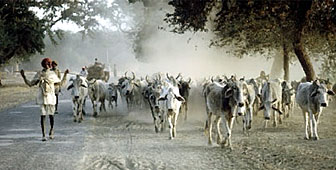India: The quiet role of Switzerland

As India tries to improve the quality of life for the one-third of its billion-strong population living beneath the poverty line, Switzerland has been quietly helping the Asian nation make important changes.
Through governmental and private agreements, Switzerland contributes more than SFr30 million (€20 million) to India, trying to help the poorest of its poor to become more self-sufficient.
The two countries have strong business ties, with trade worth SFr1.25 billion per year.
The Swiss foreign minister, Joseph Deiss, is expected to visit India this spring, returning a visit by his Indian counterpart to Bern in September, 2000.
Although the dispute between India and Pakistan over Kashmir is expected to dominate the talks, business and trade will also be high on the agenda. Switzerland, one of the top 10 foreign investors in India, has recently opened a business hub in Mumbai.
Despite the difference in size and population, India and Switzerland have a lot in common, says the Swiss ambassador to New Delhi, Walter Gyger.
“We are both federal states and we are both multicultural states,” he said. “On the Swiss banknote, you have the text in four different languages. In India, it is in 17 different languages. India really understands the importance of respecting multiculturalism within a state.
“Then India and Switzerland attach a big importance to a functioning democracy. India proves to the world that even a country with one billion inhabitants can work as a democracy.”
Swissinfo correspondent Vincent Landon travelled to India to take a closer look at Swiss projects in India and to examine the enduring relationship between the two countries.
His exclusive reports can be found in a special section on this site.
Working to save lives
In the Gujarat region, where an earthquake took 18,000 lives and 125,000 homes, the Swiss Development Agency is funding a project to study the surviving structures, so that when a quake strikes, newly built homes may be able to withstand the pressure.
The project could potentially save many lives. In the town of Bhuj, architects and engineers are experimenting with building materials and designs, to try to prevent the mistakes of the past.
Just as Switzerland funds projects to save visible structures, it also is funding programmes to bolster the less visible structures of local government.
Each year, some 10,000 people pass through the classrooms of the Kerala Institute of Local Administration (Kila) whose work is supported by the Swiss Development Agency.
With a training staff of a dozen people, Kila helps members of local government deal with such varied issues as leprosy and the need for more community health programmes. It also offers training in solid waste management and courses to encourage more women to develop leadership skills – and a host of other programmes.
Swiss-funded projects are also helping the people of India re-examine long-held attitudes toward caste and gender, an effort that could eventually improve the quality of life for many Indians.
No mediating role
While Switzerland has assisted with financial aid and expertise, it is unlikely that it will play a role in mediating the current Kashmir conflict, Gyger said.
He said this was partly out of respect for India’s insistence that it did not want any foreign intervention and partly because Switzerland’s role was limited by its non-membership in the United Nations.
“This mediation work has shifted from countries like Switzerland to players like the United States, Great Britain, the European Union and the United Nations. It’s one of the reasons we would like to join the UN, because inside this organisation, Switzerland could play a much more constructive role than outside.”
With regard to development, Gyger said the “main challenge is what can a small country like Switzerland do in a huge sub-continent like India.”
The ambassador was particularly interested in decentralisation and the promotion of federalism. “Human rights issues are close to my heart,” he said.
As for the small-scale projects of the Swiss Development Agency – with a potentially far-reaching effect – the agency, he said, has struck just the right balance.

In compliance with the JTI standards
More: SWI swissinfo.ch certified by the Journalism Trust Initiative









You can find an overview of ongoing debates with our journalists here . Please join us!
If you want to start a conversation about a topic raised in this article or want to report factual errors, email us at english@swissinfo.ch.